2022年中考英语一轮复习专题二:代词(讲义篇)(含答案)
文档属性
| 名称 | 2022年中考英语一轮复习专题二:代词(讲义篇)(含答案) | 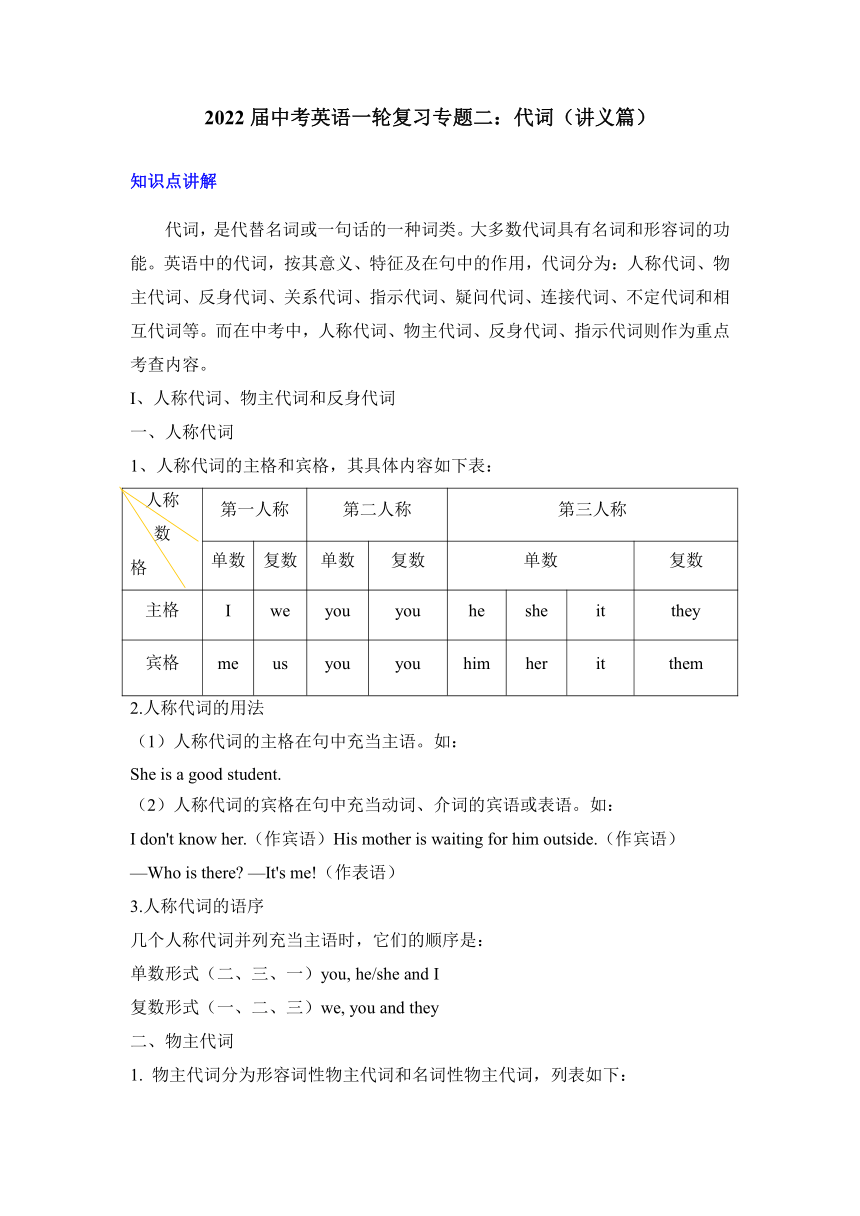 | |
| 格式 | docx | ||
| 文件大小 | 41.8KB | ||
| 资源类型 | 教案 | ||
| 版本资源 | 通用版 | ||
| 科目 | 英语 | ||
| 更新时间 | 2022-01-19 14:19:45 | ||
图片预览

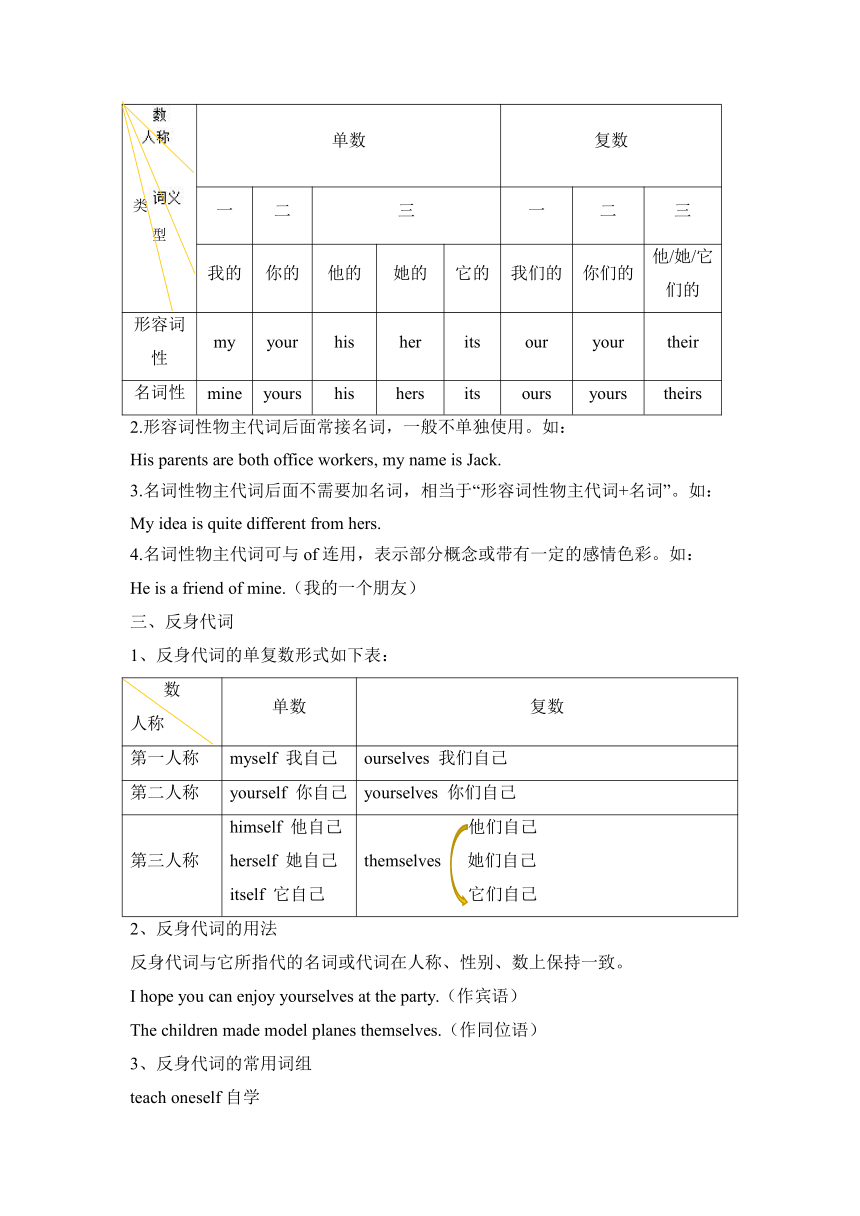
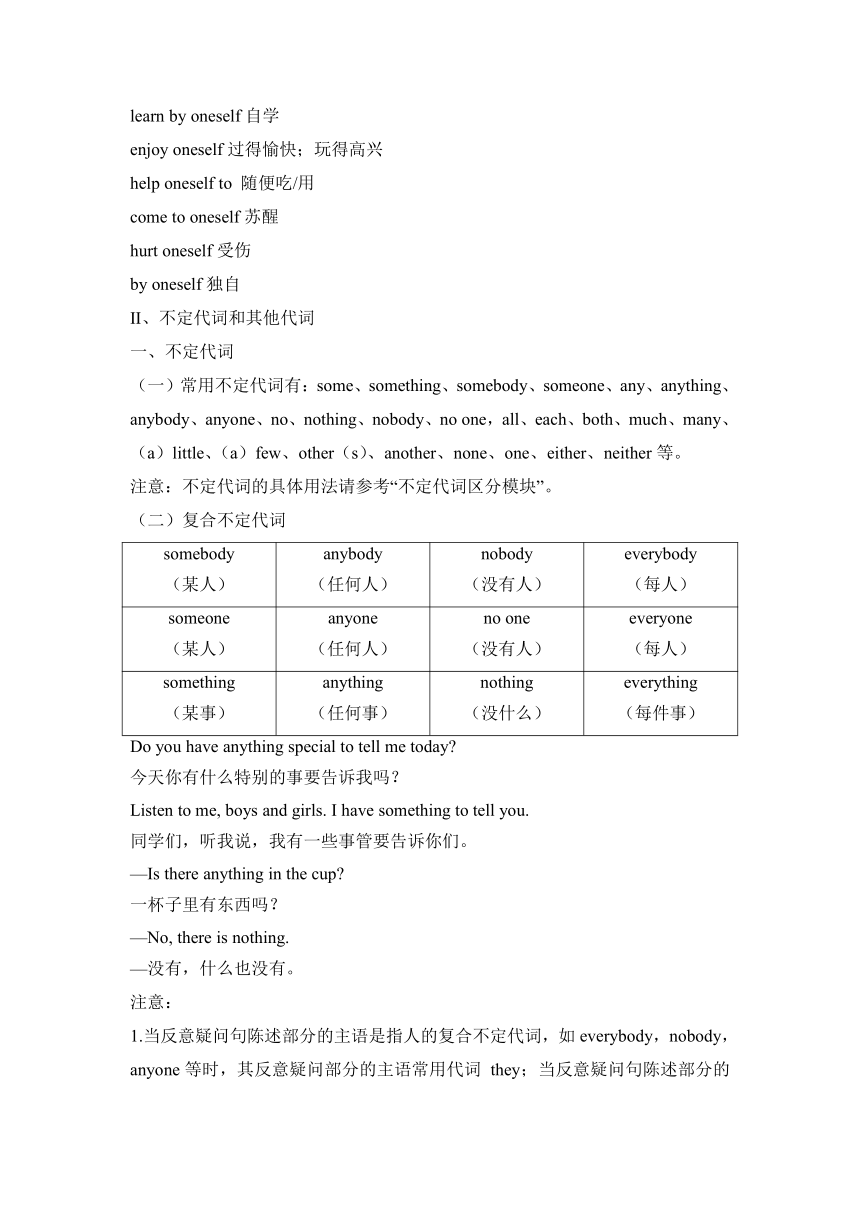
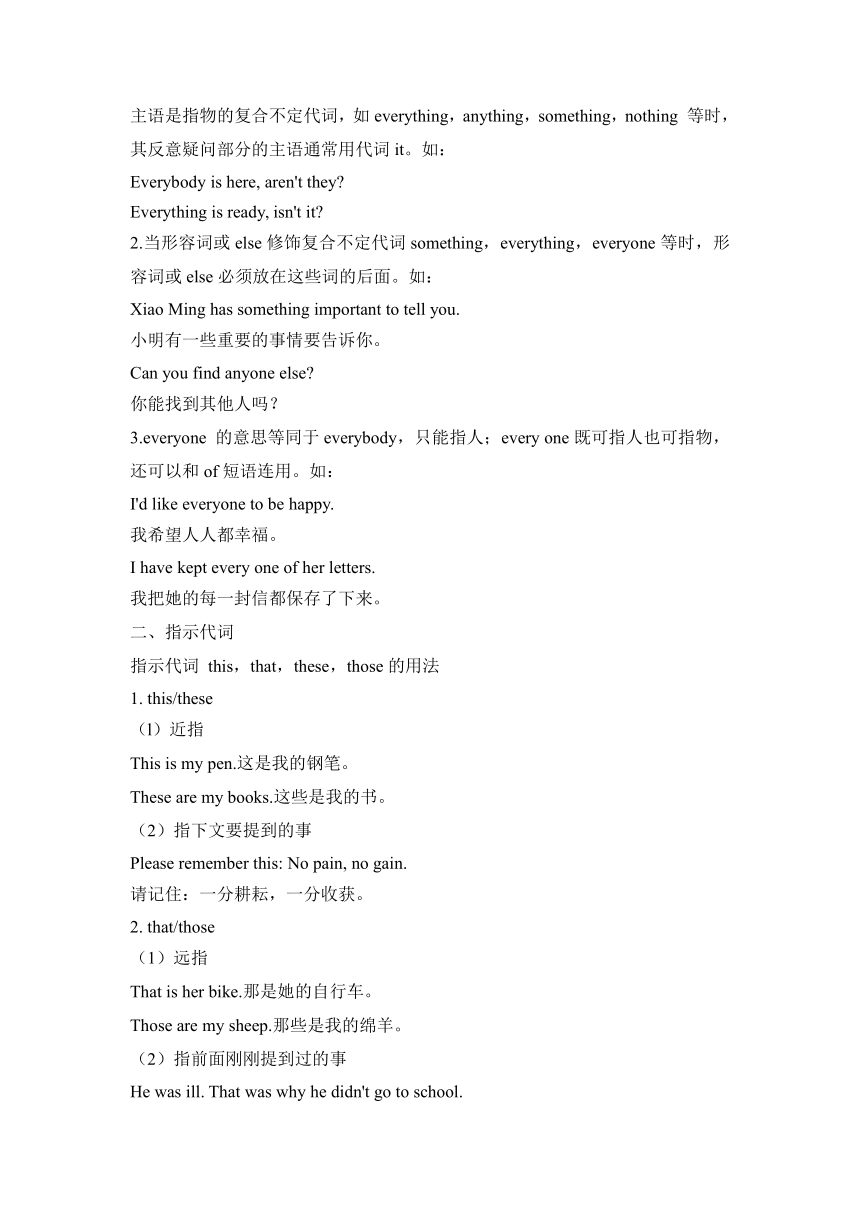
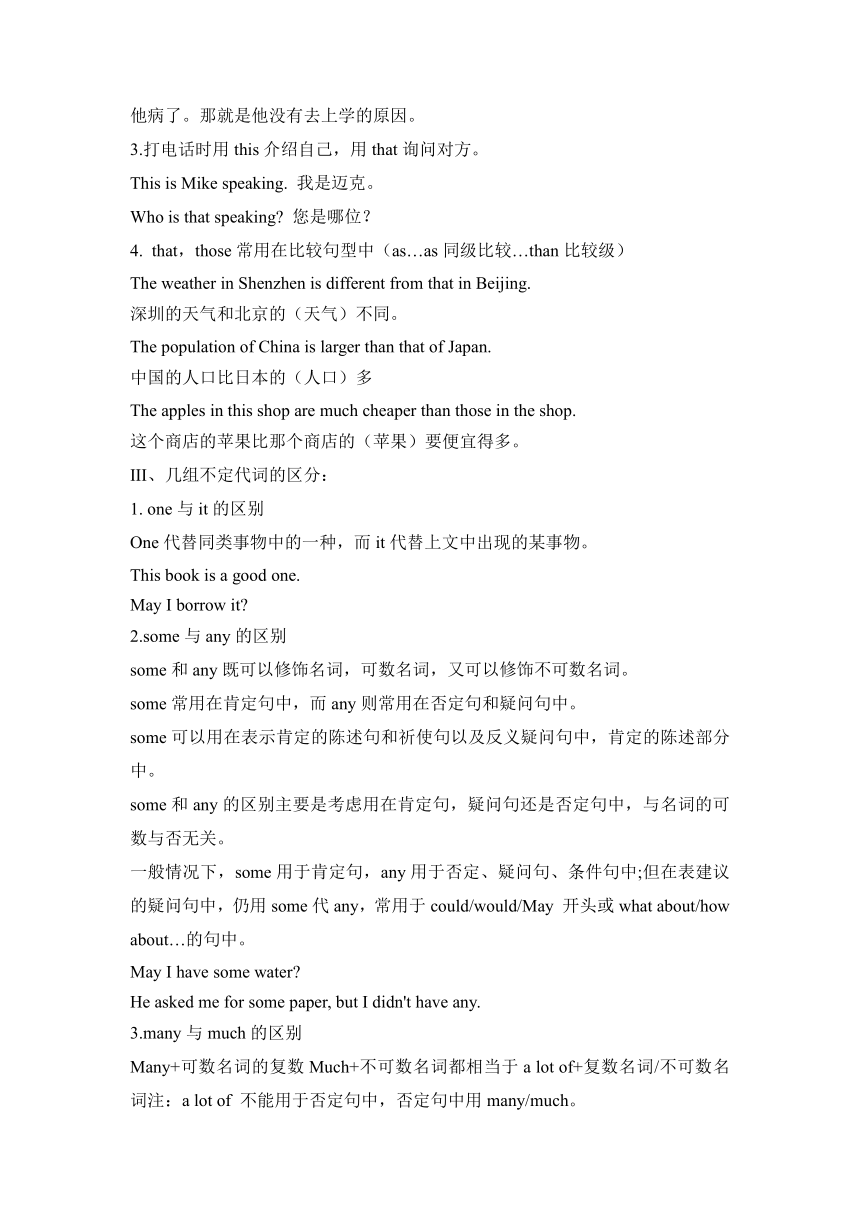
文档简介
2022届中考英语一轮复习专题二:代词(讲义篇)
知识点讲解
代词,是代替名词或一句话的一种词类。大多数代词具有名词和形容词的功能。英语中的代词,按其意义、特征及在句中的作用,代词分为:人称代词、物主代词、反身代词、关系代词、指示代词、疑问代词、连接代词、不定代词和相互代词等。而在中考中,人称代词、物主代词、反身代词、指示代词则作为重点考查内容。
I、人称代词、物主代词和反身代词
一、人称代词
1、人称代词的主格和宾格,其具体内容如下表:
人称 数 格 第一人称 第二人称 第三人称
单数 复数 单数 复数 单数 复数
主格 I we you you he she it they
宾格 me us you you him her it them
2.人称代词的用法
(1)人称代词的主格在句中充当主语。如:
She is a good student.
(2)人称代词的宾格在句中充当动词、介词的宾语或表语。如:
I don't know her.(作宾语)His mother is waiting for him outside.(作宾语)
—Who is there —It's me!(作表语)
3.人称代词的语序
几个人称代词并列充当主语时,它们的顺序是:
单数形式(二、三、一)you, he/she and I
复数形式(一、二、三)we, you and they
二、物主代词
1. 物主代词分为形容词性物主代词和名词性物主代词,列表如下:
类型 单数 复数
一 二 三 一 二 三
我的 你的 他的 她的 它的 我们的 你们的 他/她/它们的
形容词性 my your his her its our your their
名词性 mine yours his hers its ours yours theirs
2.形容词性物主代词后面常接名词,一般不单独使用。如:
His parents are both office workers, my name is Jack.
3.名词性物主代词后面不需要加名词,相当于“形容词性物主代词+名词”。如:
My idea is quite different from hers.
4.名词性物主代词可与of连用,表示部分概念或带有一定的感彩。如:
He is a friend of mine.(我的一个朋友)
三、反身代词
1、反身代词的单复数形式如下表:
数 人称 单数 复数
第一人称 myself 我自己 ourselves 我们自己
第二人称 yourself 你自己 yourselves 你们自己
第三人称 himself 他自己 herself 她自己 itself 它自己 他们自己 themselves 她们自己 它们自己
2、反身代词的用法
反身代词与它所指代的名词或代词在人称、性别、数上保持一致。
I hope you can enjoy yourselves at the party.(作宾语)
The children made model planes themselves.(作同位语)
3、反身代词的常用词组
teach oneself自学
learn by oneself自学
enjoy oneself过得愉快;玩得高兴
help oneself to 随便吃/用
come to oneself苏醒
hurt oneself受伤
by oneself独自
II、不定代词和其他代词
一、不定代词
(一)常用不定代词有:some、something、somebody、someone、any、anything、anybody、anyone、no、nothing、nobody、no one,all、each、both、much、many、(a)little、(a)few、other(s)、another、none、one、either、neither等。
注意:不定代词的具体用法请参考“不定代词区分模块”。
(二)复合不定代词
somebody (某人) anybody (任何人) nobody (没有人) everybody (每人)
someone (某人) anyone (任何人) no one (没有人) everyone (每人)
something (某事) anything (任何事) nothing (没什么) everything (每件事)
Do you have anything special to tell me today
今天你有什么特别的事要告诉我吗?
Listen to me, boys and girls. I have something to tell you.
同学们,听我说,我有一些事管要告诉你们。
—Is there anything in the cup
一杯子里有东西吗?
—No, there is nothing.
—没有,什么也没有。
注意:
1.当反意疑问句陈述部分的主语是指人的复合不定代词,如everybody,nobody,anyone等时,其反意疑问部分的主语常用代词 they;当反意疑问句陈述部分的主语是指物的复合不定代词,如everything,anything,something,nothing 等时,其反意疑问部分的主语通常用代词it。如:
Everybody is here, aren't they
Everything is ready, isn't it
2.当形容词或else修饰复合不定代词something,everything,everyone等时,形容词或else必须放在这些词的后面。如:
Xiao Ming has something important to tell you.
小明有一些重要的事情要告诉你。
Can you find anyone else
你能找到其他人吗?
3.everyone 的意思等同于everybody,只能指人;every one既可指人也可指物,还可以和of短语连用。如:
I'd like everyone to be happy.
我希望人人都幸福。
I have kept every one of her letters.
我把她的每一封信都保存了下来。
二、指示代词
指示代词 this,that,these,those的用法
1. this/these
(l)近指
This is my pen.这是我的钢笔。
These are my books.这些是我的书。
(2)指下文要提到的事
Please remember this: No pain, no gain.
请记住:一分耕耘,一分收获。
2. that/those
(1)远指
That is her bike.那是她的自行车。
Those are my sheep.那些是我的绵羊。
(2)指前面刚刚提到过的事
He was ill. That was why he didn't go to school.
他病了。那就是他没有去上学的原因。
3.打电话时用this介绍自己,用that询问对方。
This is Mike speaking. 我是迈克。
Who is that speaking 您是哪位?
that,those常用在比较句型中(as…as同级比较…than比较级)
The weather in Shenzhen is different from that in Beijing.
深圳的天气和北京的(天气)不同。
The population of China is larger than that of Japan.
中国的人口比日本的(人口)多
The apples in this shop are much cheaper than those in the shop.
这个商店的苹果比那个商店的(苹果)要便宜得多。
III、几组不定代词的区分:
1. one与it的区别
One代替同类事物中的一种,而it代替上文中出现的某事物。
This book is a good one.
May I borrow it
2.some与any的区别
some和any既可以修饰名词,可数名词,又可以修饰不可数名词。
some常用在肯定句中,而any则常用在否定句和疑问句中。
some可以用在表示肯定的陈述句和祈使句以及反义疑问句中,肯定的陈述部分中。
some和any的区别主要是考虑用在肯定句,疑问句还是否定句中,与名词的可数与否无关。
一般情况下,some用于肯定句,any用于否定、疑问句、条件句中;但在表建议的疑问句中,仍用some代any,常用于could/would/May 开头或what about/how about…的句中。
May I have some water
He asked me for some paper, but I didn't have any.
3.many与much的区别
Many+可数名词的复数Much+不可数名词都相当于a lot of+复数名词/不可数名词注:a lot of 不能用于否定句中,否定句中用many/much。
4.a few/few/a little/little的区别
The story is easy to read.
There are new words in it.
Hurry up! There is time left.
5.each/every的区别
each表示两者或两者以上的人或物中的每一个,而every表示三者或三者以上的人或物中的每一个。
There are trees and flowers on side of the street.
Student has read a story
注:each 可以与of 连用,each of作主语时,谓语动词用单数。而every 不能与of连用,只能放在名词前作定语。
Each of us (study) hard.
6.no one与none的区别
no one表示没有人,不能与of连用。而none of+复数名词/代词,作主语时,谓语常用单数。
The boys were all tired, but none of them stopped to have a rest.
7.both/neither/either/all/none/any的区别
There are many trees on side of the river.
A. both B. any C. either D. all
注:1)both的否定词是neither,all的否定词是none。
2)both of 作主语时谓语动词用复数
neither of作主语时,谓语动词用单数。
Neither of the answers (is) right.
Both of my parents (are) workers.
3)词组
A)both...and…连接两个主语时,谓语动词用复数。同义词组:not only...but also…反义词组:
neither...nor...
Not only you but also she likes watching TV. = Both you and she like watching TV.
B)either...or…或者……或者.....,neither...no...既不……也不……连接两个主语时,谓语动词实行就近原则。
Neither you nor he is (be) right.
One of Lily and Lucy is going to the park. =Lily or Lucy is going to the park.
C)either也可用于否定句中的“也"
D)neither 也可表示“也不”句型:neither... sb. 某人也不怎么样。
If you don't go there, neither do I(我也不去)
4)how many/how much 的回答:用none回答.
Who的回答:用no one回答.
What 的.回答:用nothing回答。
How many students are there in the classroom
Who can answer the question
A. None B. No one C. Nothing
8.other/the other/others/the others的区别注:
1)one...the other…表示两者之间的一个......另一个……
2)some…others...表示一些……一些……
3)another表示三者以上的不确定数目中的另一个,只能修饰可数名词的单数,但another+数字+复数名词=数字+more+复数名词表示“另外几个......”。
Would you like apple
I have two brothers, one is a teacher, and the other is a worker.
Some are cleaning the classroom, others are sweeping the window.
There are 20 teachers in our school. Eight of them are men teachers, and another twelve are women teachers
典例剖析
一、单项选择
1.This isn't my dictionary. is over there, on the desk.
A. His B. Mine C. Hers D. Yours
2.Mike has lost new watch. He is looking for it everywhere.
A. he B. his C. him
3.Mary's birthday is coming. We've decided to make a cake for .
A. him B. her C. you D. them
4.My best friend and were fixing up the broken machine when the rainstorm came.
A. I B. me C. mine
5.—Lily, is this your pen
—No, it isn't . It is Linda's.
A. my B. mine C. your D. yours
6.—Excuse me, he is Xingguang Theatre
—go along this road to the end, and you'll find on your left.
A. it B. any C. one
7.—When shall I come to your home, in the morning or afternoon
— . I'll be in all day.
A. Either B. Neither C. None D. Another
8.—There are mainly six kinds of tea in China. Which is your favorite
—Green tea, I guess. I've tried black tea, green tea and so on, and of them have their special tastes.
A. all B. both C. none D. neither
二、单句填空
1.When I fell and hurt (I), my mother encouraged me to stand up and gave me a hug.
2.I couldn't find my computer, so my sister asked me to use (她的).
3.I promised Li Ming I would keep the secret to (我自己).
4.(2021山东临沂,52)Yesterday Alice tried paragliding (滑翔伞运动) and she enjoyed (her) very much.
5.These two sweaters are so expensive that I can afford n of them.
6. took him lots of time to work out the value—between 3.1415926 and 3.1415927.
7.After that, we (两个都) went back to reading and enjoying the beauty outside.
答案以及解析
一、单选题
1. B本题考查代词。根据语境可知,设空处指的是“我的词典”,故答案为B。
2. B考查代词。设空处修饰名词,要用形容词性物主代词,故选B。
3. B句意:玛丽的生日快到了。我们决定为她做一个蛋糕。本题考查人称代词。根据语境可知,设空处指代上文中的Mary,故选B。
4. A本题考查代词。and连接的两个部分作主语,应用主格。故选A。
5. B此处表示“不是我的”,且空后无名词,故选B。
6. A句意:—打扰一下,星光剧院在哪里?—沿着这条路走到尽头,它就在你的左边。本题考查代词。此处指代上文出现过的Xingguang Theatre,应用it。故答案为A。
7. A本题考查不定代词。either(两者中)任何一个;neither(两者)都不;none(三者或三者以上)没有一个;another(三者或三者以上中的)另一个。由“I’ll be in all day.”可知,拜访者上午或下午到访都可以。故答案为A。
8. A本题考查代词。all三者或三者以上都;both两者都;none三者或三者以上都不;neither两者都不,根据语境可知此处表示肯定,故排除C、D。根据空前的black tea,green tea and so on可知,此处所述的各自有特殊的味道的茶至少有三种,故选A。
二、单句填空
1. myself 本题考查代词。hurt oneself伤到自己,I的反身代词形式为myself。
2. hers 本题考查名词性物主代词。句意:我找不到我的电脑,所以我姐姐让我用她的。此处用hers代替her computer。
3. myself keep a secret to oneself 意为“保守秘密”。故答案为myself。
4. herself enjoy oneself 意为“玩得愉快”,故填反身代词herself。
5. neither 句意:这两件毛衣太贵了,我都买不起。所以设空处要填否定词。上文提到two sweaters,所以应填neither,表示“两者都不”。
6. It It takes/took sb. +一段时间+to do sth.是固定句型,It作形式主语。故填It。
7. both both两者都。both作we的同位语。
知识点讲解
代词,是代替名词或一句话的一种词类。大多数代词具有名词和形容词的功能。英语中的代词,按其意义、特征及在句中的作用,代词分为:人称代词、物主代词、反身代词、关系代词、指示代词、疑问代词、连接代词、不定代词和相互代词等。而在中考中,人称代词、物主代词、反身代词、指示代词则作为重点考查内容。
I、人称代词、物主代词和反身代词
一、人称代词
1、人称代词的主格和宾格,其具体内容如下表:
人称 数 格 第一人称 第二人称 第三人称
单数 复数 单数 复数 单数 复数
主格 I we you you he she it they
宾格 me us you you him her it them
2.人称代词的用法
(1)人称代词的主格在句中充当主语。如:
She is a good student.
(2)人称代词的宾格在句中充当动词、介词的宾语或表语。如:
I don't know her.(作宾语)His mother is waiting for him outside.(作宾语)
—Who is there —It's me!(作表语)
3.人称代词的语序
几个人称代词并列充当主语时,它们的顺序是:
单数形式(二、三、一)you, he/she and I
复数形式(一、二、三)we, you and they
二、物主代词
1. 物主代词分为形容词性物主代词和名词性物主代词,列表如下:
类型 单数 复数
一 二 三 一 二 三
我的 你的 他的 她的 它的 我们的 你们的 他/她/它们的
形容词性 my your his her its our your their
名词性 mine yours his hers its ours yours theirs
2.形容词性物主代词后面常接名词,一般不单独使用。如:
His parents are both office workers, my name is Jack.
3.名词性物主代词后面不需要加名词,相当于“形容词性物主代词+名词”。如:
My idea is quite different from hers.
4.名词性物主代词可与of连用,表示部分概念或带有一定的感彩。如:
He is a friend of mine.(我的一个朋友)
三、反身代词
1、反身代词的单复数形式如下表:
数 人称 单数 复数
第一人称 myself 我自己 ourselves 我们自己
第二人称 yourself 你自己 yourselves 你们自己
第三人称 himself 他自己 herself 她自己 itself 它自己 他们自己 themselves 她们自己 它们自己
2、反身代词的用法
反身代词与它所指代的名词或代词在人称、性别、数上保持一致。
I hope you can enjoy yourselves at the party.(作宾语)
The children made model planes themselves.(作同位语)
3、反身代词的常用词组
teach oneself自学
learn by oneself自学
enjoy oneself过得愉快;玩得高兴
help oneself to 随便吃/用
come to oneself苏醒
hurt oneself受伤
by oneself独自
II、不定代词和其他代词
一、不定代词
(一)常用不定代词有:some、something、somebody、someone、any、anything、anybody、anyone、no、nothing、nobody、no one,all、each、both、much、many、(a)little、(a)few、other(s)、another、none、one、either、neither等。
注意:不定代词的具体用法请参考“不定代词区分模块”。
(二)复合不定代词
somebody (某人) anybody (任何人) nobody (没有人) everybody (每人)
someone (某人) anyone (任何人) no one (没有人) everyone (每人)
something (某事) anything (任何事) nothing (没什么) everything (每件事)
Do you have anything special to tell me today
今天你有什么特别的事要告诉我吗?
Listen to me, boys and girls. I have something to tell you.
同学们,听我说,我有一些事管要告诉你们。
—Is there anything in the cup
一杯子里有东西吗?
—No, there is nothing.
—没有,什么也没有。
注意:
1.当反意疑问句陈述部分的主语是指人的复合不定代词,如everybody,nobody,anyone等时,其反意疑问部分的主语常用代词 they;当反意疑问句陈述部分的主语是指物的复合不定代词,如everything,anything,something,nothing 等时,其反意疑问部分的主语通常用代词it。如:
Everybody is here, aren't they
Everything is ready, isn't it
2.当形容词或else修饰复合不定代词something,everything,everyone等时,形容词或else必须放在这些词的后面。如:
Xiao Ming has something important to tell you.
小明有一些重要的事情要告诉你。
Can you find anyone else
你能找到其他人吗?
3.everyone 的意思等同于everybody,只能指人;every one既可指人也可指物,还可以和of短语连用。如:
I'd like everyone to be happy.
我希望人人都幸福。
I have kept every one of her letters.
我把她的每一封信都保存了下来。
二、指示代词
指示代词 this,that,these,those的用法
1. this/these
(l)近指
This is my pen.这是我的钢笔。
These are my books.这些是我的书。
(2)指下文要提到的事
Please remember this: No pain, no gain.
请记住:一分耕耘,一分收获。
2. that/those
(1)远指
That is her bike.那是她的自行车。
Those are my sheep.那些是我的绵羊。
(2)指前面刚刚提到过的事
He was ill. That was why he didn't go to school.
他病了。那就是他没有去上学的原因。
3.打电话时用this介绍自己,用that询问对方。
This is Mike speaking. 我是迈克。
Who is that speaking 您是哪位?
that,those常用在比较句型中(as…as同级比较…than比较级)
The weather in Shenzhen is different from that in Beijing.
深圳的天气和北京的(天气)不同。
The population of China is larger than that of Japan.
中国的人口比日本的(人口)多
The apples in this shop are much cheaper than those in the shop.
这个商店的苹果比那个商店的(苹果)要便宜得多。
III、几组不定代词的区分:
1. one与it的区别
One代替同类事物中的一种,而it代替上文中出现的某事物。
This book is a good one.
May I borrow it
2.some与any的区别
some和any既可以修饰名词,可数名词,又可以修饰不可数名词。
some常用在肯定句中,而any则常用在否定句和疑问句中。
some可以用在表示肯定的陈述句和祈使句以及反义疑问句中,肯定的陈述部分中。
some和any的区别主要是考虑用在肯定句,疑问句还是否定句中,与名词的可数与否无关。
一般情况下,some用于肯定句,any用于否定、疑问句、条件句中;但在表建议的疑问句中,仍用some代any,常用于could/would/May 开头或what about/how about…的句中。
May I have some water
He asked me for some paper, but I didn't have any.
3.many与much的区别
Many+可数名词的复数Much+不可数名词都相当于a lot of+复数名词/不可数名词注:a lot of 不能用于否定句中,否定句中用many/much。
4.a few/few/a little/little的区别
The story is easy to read.
There are new words in it.
Hurry up! There is time left.
5.each/every的区别
each表示两者或两者以上的人或物中的每一个,而every表示三者或三者以上的人或物中的每一个。
There are trees and flowers on side of the street.
Student has read a story
注:each 可以与of 连用,each of作主语时,谓语动词用单数。而every 不能与of连用,只能放在名词前作定语。
Each of us (study) hard.
6.no one与none的区别
no one表示没有人,不能与of连用。而none of+复数名词/代词,作主语时,谓语常用单数。
The boys were all tired, but none of them stopped to have a rest.
7.both/neither/either/all/none/any的区别
There are many trees on side of the river.
A. both B. any C. either D. all
注:1)both的否定词是neither,all的否定词是none。
2)both of 作主语时谓语动词用复数
neither of作主语时,谓语动词用单数。
Neither of the answers (is) right.
Both of my parents (are) workers.
3)词组
A)both...and…连接两个主语时,谓语动词用复数。同义词组:not only...but also…反义词组:
neither...nor...
Not only you but also she likes watching TV. = Both you and she like watching TV.
B)either...or…或者……或者.....,neither...no...既不……也不……连接两个主语时,谓语动词实行就近原则。
Neither you nor he is (be) right.
One of Lily and Lucy is going to the park. =Lily or Lucy is going to the park.
C)either也可用于否定句中的“也"
D)neither 也可表示“也不”句型:neither... sb. 某人也不怎么样。
If you don't go there, neither do I(我也不去)
4)how many/how much 的回答:用none回答.
Who的回答:用no one回答.
What 的.回答:用nothing回答。
How many students are there in the classroom
Who can answer the question
A. None B. No one C. Nothing
8.other/the other/others/the others的区别注:
1)one...the other…表示两者之间的一个......另一个……
2)some…others...表示一些……一些……
3)another表示三者以上的不确定数目中的另一个,只能修饰可数名词的单数,但another+数字+复数名词=数字+more+复数名词表示“另外几个......”。
Would you like apple
I have two brothers, one is a teacher, and the other is a worker.
Some are cleaning the classroom, others are sweeping the window.
There are 20 teachers in our school. Eight of them are men teachers, and another twelve are women teachers
典例剖析
一、单项选择
1.This isn't my dictionary. is over there, on the desk.
A. His B. Mine C. Hers D. Yours
2.Mike has lost new watch. He is looking for it everywhere.
A. he B. his C. him
3.Mary's birthday is coming. We've decided to make a cake for .
A. him B. her C. you D. them
4.My best friend and were fixing up the broken machine when the rainstorm came.
A. I B. me C. mine
5.—Lily, is this your pen
—No, it isn't . It is Linda's.
A. my B. mine C. your D. yours
6.—Excuse me, he is Xingguang Theatre
—go along this road to the end, and you'll find on your left.
A. it B. any C. one
7.—When shall I come to your home, in the morning or afternoon
— . I'll be in all day.
A. Either B. Neither C. None D. Another
8.—There are mainly six kinds of tea in China. Which is your favorite
—Green tea, I guess. I've tried black tea, green tea and so on, and of them have their special tastes.
A. all B. both C. none D. neither
二、单句填空
1.When I fell and hurt (I), my mother encouraged me to stand up and gave me a hug.
2.I couldn't find my computer, so my sister asked me to use (她的).
3.I promised Li Ming I would keep the secret to (我自己).
4.(2021山东临沂,52)Yesterday Alice tried paragliding (滑翔伞运动) and she enjoyed (her) very much.
5.These two sweaters are so expensive that I can afford n of them.
6. took him lots of time to work out the value—between 3.1415926 and 3.1415927.
7.After that, we (两个都) went back to reading and enjoying the beauty outside.
答案以及解析
一、单选题
1. B本题考查代词。根据语境可知,设空处指的是“我的词典”,故答案为B。
2. B考查代词。设空处修饰名词,要用形容词性物主代词,故选B。
3. B句意:玛丽的生日快到了。我们决定为她做一个蛋糕。本题考查人称代词。根据语境可知,设空处指代上文中的Mary,故选B。
4. A本题考查代词。and连接的两个部分作主语,应用主格。故选A。
5. B此处表示“不是我的”,且空后无名词,故选B。
6. A句意:—打扰一下,星光剧院在哪里?—沿着这条路走到尽头,它就在你的左边。本题考查代词。此处指代上文出现过的Xingguang Theatre,应用it。故答案为A。
7. A本题考查不定代词。either(两者中)任何一个;neither(两者)都不;none(三者或三者以上)没有一个;another(三者或三者以上中的)另一个。由“I’ll be in all day.”可知,拜访者上午或下午到访都可以。故答案为A。
8. A本题考查代词。all三者或三者以上都;both两者都;none三者或三者以上都不;neither两者都不,根据语境可知此处表示肯定,故排除C、D。根据空前的black tea,green tea and so on可知,此处所述的各自有特殊的味道的茶至少有三种,故选A。
二、单句填空
1. myself 本题考查代词。hurt oneself伤到自己,I的反身代词形式为myself。
2. hers 本题考查名词性物主代词。句意:我找不到我的电脑,所以我姐姐让我用她的。此处用hers代替her computer。
3. myself keep a secret to oneself 意为“保守秘密”。故答案为myself。
4. herself enjoy oneself 意为“玩得愉快”,故填反身代词herself。
5. neither 句意:这两件毛衣太贵了,我都买不起。所以设空处要填否定词。上文提到two sweaters,所以应填neither,表示“两者都不”。
6. It It takes/took sb. +一段时间+to do sth.是固定句型,It作形式主语。故填It。
7. both both两者都。both作we的同位语。
同课章节目录
- 词法
- 名词
- 动词和动词短语
- 动词语态
- 动词时态
- 助动词和情态动词
- 非谓语动词
- 冠词
- 代词
- 数词和量词
- 形容词副词及其比较等级
- 介词和介词短语
- 连词和感叹词
- 构词法
- 相似、相近词比较
- 句法
- 陈述句
- 一般疑问句和否定疑问句
- 特殊疑问句及选择疑问句
- 反意疑问句
- 存在句(There be句型)
- 宾语从句
- 定语从句
- 状语从句
- 主谓一致问题
- 简单句
- 并列句
- 复合句
- 主谓一致
- 主、表语从句
- 名词性从句
- 直接引语和间接引语
- 虚拟语气
- 感叹句
- 强调句
- 倒装句
- 祈使句
- 句子的成分
- 句子的分类
- 题型专区
- 单项选择部分
- 易错题
- 完形填空
- 阅读理解
- 词汇练习
- 听说训练
- 句型转换
- 补全对话
- 短文改错
- 翻译
- 书面表达
- 任务型阅读
- 语法填空
- 其他资料
